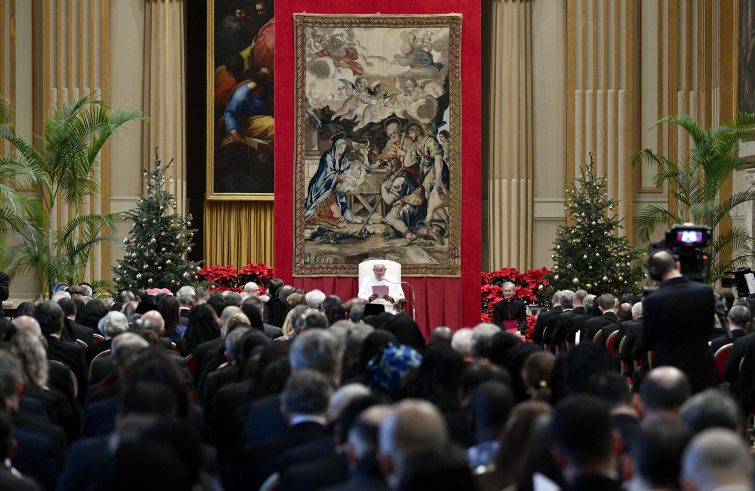
At a time of escalating conflicts and ethical challenges, the words of Pope Francis (delivered yesterday, 8 January, in his address to the Diplomatic Corps accredited to the Holy See) are a powerful reminder to us all of the urgency and overriding common responsibility of building peace, promoting its preconditions and defending it against the countless threats that continually undermine its very foundations. In the face of recent events, this commitment must necessarily be rooted in the firm rejection of all wars and of the multiple horrors that they entail. With sadness, the Pope reiterated his reflection on a world torn apart by “a growing number of conflicts that in fact constitute “a third world war fought piecemeal.” This dangerous drift in the direction of a global conflict calls for an urgent and concerted effort for peace.
extending his gaze, Pope Francis highlighted a further essential condition for genuine and lasting peace, namely,
“respect for life, for every human life, starting with the life of the unborn child in the mother’s womb, which cannot be suppressed or turned into an object of trafficking”
Placing bioethical reflection in the context of numerous current issues, Francis reiterated his moral disapproval of surrogacy practices. It is “based on the exploitation of situations of the mother’s material needs”, the Pope said.
“A child is always a gift and never the basis of a commercial contract.”
The Pope expressed his “hope for an effort by the international community to prohibit this practice universally.”
Pope Francis pointed out that “at every moment of its existence, human life must be preserved and defended”, especially before “the continued spread of a culture of death, which in the name of a false compassion discards children, the elderly and the sick.” The Pope thus highlighted the importance of human rights, laid down in the simple yet clear formulation contained in the Universal Declaration of Human Rights. “These principles are self-evident and commonly accepted.”
Moreover,
Francis notes that attempts in recent decades to introduce new rights, which are “not fully consistent with those originally defined nor always acceptable”, have led to instances of “ideological colonisation.”
Among these, the Pope specifically mentioned the so-called “gender theory”, describing it as “extremely dangerous” because of its tendency to cancel natural and fundamental differences between individuals. “These instances of ideological colonization – the Pope remarks – prove injurious and create divisions between states, rather than fostering peace.”
A passage of the Pope’s speech focused on the challenge of education – especially of the young – that we face today, including the ethical use of new technologies.
“They can easily become a means of spreading division or lies, fake news, yet they also serve as a source of encounter and mutual exchange, and an important vehicle for peace.”
In this context, the Pope placed particular emphasis on artificial intelligence. In order to ensure that its use is respectful of the human person, Francis recalled that “itt is essential that technological development take place in an ethical and responsible way, respecting the centrality of the human person, whose place can never be taken by an algorithm or a machine. The inherent dignity of each human being and the fraternity that binds us together as members of the one human family must undergird the development of new technologies and serve as indisputable criteria for evaluating them before they are employed, so that digital progress can occur with due respect for justice and contribute to the cause of peace.”
However, Pope Francis did not limit himself to denouncing the problems of our time. He also renewed a heartfelt call to build peace through dialogue, mutual respect and understanding, while actively working for mutual well-being and respect for human dignity.
In short, Pope Francis’ words are a reminder to rethink our priorities and values in a rapidly changing world. They invite us to reflect on how
our actions and choices affect peace and the perception of human dignity.
Respect, mutual understanding and universal love must therefore continue to be the guiding principles which, put into practice with the support of ethical reflection, must help us to face with confidence the great challenges of our time.
In this age of technology and innovation, respect for human life and humanity are the fundamental pillars for building a future of harmony and peace for all.












